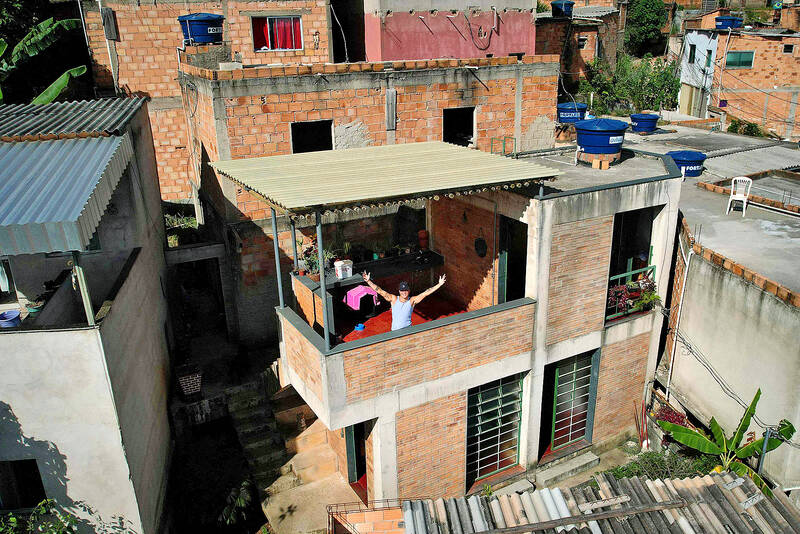At first glance, it is a house like dozens of others in the crowded favelas of Brazil.
However, this seemingly modest dwelling of 66m2, with its exposed brick walls, has just been recognized as the “house of the year” in an international architecture competition.
The house honored by specialized Web site ArchDaily belongs to Kdu dos Anjos, a 32-year-old musical artist living in the bustling Aglomerado da Serra favela, at the bottom of a hill on the edge of the southeastern city of Belo Horizonte.

Photo: AFP
The two-story structure defeated some more imposing contest entries from India, Mexico, Vietnam and Germany.
“I’m very proud that my house won this prize, because most of the news about the favelas talks of violence and homes destroyed by landslides,” said Kdu dos Anjos, who has close-cropped hair, black earrings and many tattoos.
“Today, my home is on top of the world,” Dos Anjos said.
The house, built on a small lot Dos Anjos purchased in 2017, is well-ventilated and enjoys abundant natural light; it features horizontal casement windows and a large terrace.
“The design of the house represents a constructive model that uses common materials in the slums, with an adequate implementation and attention to lighting and ventilation, resulting in a space with great environmental quality,” ArchDaily wrote on its Web site.
For Dos Anjos, who founded a cultural center in his community, the prize carries special significance.
“I know my house isn’t the most chic in the world, but it’s a well-built shack,” he said with a grin.
Dos Anjos has been living there since 2020, along with two dogs, a cat and more than 60 plants.
“What the architects did is pure magic,” he added. “We barely have 66 square meters, but I’ve had parties here with close to 200 people.”
The design was the work of the Levante architecture collective, which does pro-bono or low-cost work in the favelas.
From the outside the house resembles its neighbors, but it incorporates several features that make it both sturdier and more respectful of the environment, particularly in its “attention to lighting and ventilation,” said architect Fernando Maculan, the project leader.
One apparent difference with nearby houses is in the arrangement of the bricks, which are laid horizontally — not vertically — and in staggered rows, which adds solidity and improves insulation. The project took eight months — and a lot of work.
“The masons were angry because they thought laying bricks this way was very time-consuming,” Maculan said.
“And we had a lot of trouble getting the materials up the stairs — it’s the last house on the alley, and I had to pay the workers who carried it a lot,” he said.
The narrow, twisting roads in the favela are difficult for vehicles to navigate. The entire job cost 150,000 reals (US$28,789), and the investment paid off in more ways than one: Not only did the architecture prize bring international recognition, the house has helped Dos Anjos realize a childhood dream.
“When I was a boy, I lived in a very modest, poorly insulated room. I even got stung by a scorpion — my sister did, too,” he said. “Winning this prize after having suffered from architecture-related problems represents a great victory for me.”

Packed crowds in India celebrating their cricket team’s victory ended in a deadly stampede on Wednesday, with 11 mainly young fans crushed to death, the local state’s chief minister said. Joyous cricket fans had come out to celebrate and welcome home their heroes, Royal Challengers Bengaluru, after they beat Punjab Kings in a roller-coaster Indian Premier League (IPL) cricket final on Tuesday night. However, the euphoria of the vast crowds in the southern tech city of Bengaluru ended in disaster, with Indian Prime Minister Narendra calling it “absolutely heartrending.” Karnataka Chief Minister Siddaramaiah said most of the deceased are young, with 11 dead

By 2027, Denmark would relocate its foreign convicts to a prison in Kosovo under a 200-million-euro (US$228.6 million) agreement that has raised concerns among non-governmental organizations (NGOs) and residents, but which could serve as a model for the rest of the EU. The agreement, reached in 2022 and ratified by Kosovar lawmakers last year, provides for the reception of up to 300 foreign prisoners sentenced in Denmark. They must not have been convicted of terrorism or war crimes, or have a mental condition or terminal disease. Once their sentence is completed in Kosovan, they would be deported to their home country. In

Brazil, the world’s largest Roman Catholic country, saw its Catholic population decline further in 2022, while evangelical Christians and those with no religion continued to rise, census data released on Friday by the Brazilian Institute of Geography and Statistics (IBGE) showed. The census indicated that Brazil had 100.2 million Roman Catholics in 2022, accounting for 56.7 percent of the population, down from 65.1 percent or 105.4 million recorded in the 2010 census. Meanwhile, the share of evangelical Christians rose to 26.9 percent last year, up from 21.6 percent in 2010, adding 12 million followers to reach 47.4 million — the highest figure

LOST CONTACT: The mission carried payloads from Japan, the US and Taiwan’s National Central University, including a deep space radiation probe, ispace said Japanese company ispace said its uncrewed moon lander likely crashed onto the moon’s surface during its lunar touchdown attempt yesterday, marking another failure two years after its unsuccessful inaugural mission. Tokyo-based ispace had hoped to join US firms Intuitive Machines and Firefly Aerospace as companies that have accomplished commercial landings amid a global race for the moon, which includes state-run missions from China and India. A successful mission would have made ispace the first company outside the US to achieve a moon landing. Resilience, ispace’s second lunar lander, could not decelerate fast enough as it approached the moon, and the company has